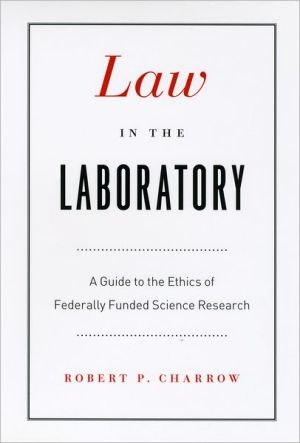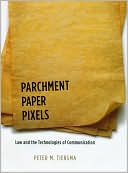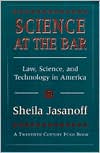Law in the Laboratory: A Guide to the Ethics of Federally Funded Science Research
The National Institutes of Health and the National Science Foundation together fund more than $40 billon of research annually in the United States and around the globe. These large public expenditures come with strings, including a complex set of laws and guidelines that regulate how scientists may use NIH and NSF funds, how federally funded research may be conducted, and who may have access to or own the product of the research.\ Until now, researchers have had little instruction on the...
Search in google:
The National Institutes of Health and the National Science Foundation together fund more than $40 billon of research annually in the United States and around the globe. These large public expenditures come with strings, including a complex set of laws and guidelines that regulate how scientists may use NIH and NSF funds, how federally funded research may be conducted, and who may have access to or own the product of the research.Until now, researchers have had little instruction on the nature of these laws and how they work. But now, with Robert P. Charrow’s Law in the Laboratory, they have a readable and entertaining introduction to the major ethical and legal considerations pertaining to research under the aegis of federal science funding. For any academic whose position is grant funded, or for any faculty involved in securing grants, this book will be an essential reference manual. And for those who want to learn how federal legislation and regulations affect laboratory research, Charrow’s primer will shed light on the often obscured intersection of government and science.
Preface 1 Observations about the Law, the Legal Mind, and Our Legal System 2 Government Funding of Research in the United States3 How Is the “Integrity of Research” Regulated: What Is Research Misconduct?4 Protecting Human Subjects: Bits, Bytes, and Biopsies5 Financial Confl icts of Interest: Th e Legacy of Shoeless Joe Jackson6 Who Can Gain Access to Your Data?7 Intellectual Property: Who Owns Your Inventions, Words, Data, and Specimens?8 What Regulations Govern the Welfare of Laboratory Animals? Appendix A: A Short Guide to the Unusual World of Legal CitationsAppendix B: Oft en-Used AbbreviationsAppendix C: Links to Relevant Laws and RegulationsAppendix D: Approaches to Problems Index
\ Journal of the American Medical Association[Law in the Laboratory] does an outstanding job . . . covering in an authoritative fashion most if not all of the issues of which a researcher seeking or using federal funds should be aware. . . . It is well written and enlivened with numerous historical anecdotes and amusing examples. . . . [R]esearchers using it to understand legal complexities and avoid potential pitfalls will find it exceptionally valuable.\ — Samuel Y. Sessions\ \ \ \ \ \ Law Library Journal“Law in the Laboratory is an interesting and informative read. . . . [Charrow] does an excellent job of weaving legislative history into an account that covers topics such as the grant award process, government funding agencies and other participants in the system, and the availability of recourse for unsuccessful grant applicants. Charrow’s dissection of the funding process and his explanation of the various parties to a grant provide valuable insight into a world foreign to many of his readers.”—Law Library Journal\ — Therese A. Clarke Arado\ \ \ \ Journal of the American Medical Association\ - Samuel Y. Sessions\ “[Law in the Laboratory] does an outstanding job . . . covering in an authoritative fashion most if not all of the issues of which a researcher seeking or using federal funds should be aware. . . . It is well written and enlivened with numerous historical anecdotes and amusing examples. . . . [R]esearchers using it to understand legal complexities and avoid potential pitfalls will find it exceptionally valuable.”\ \ \ \ \ \ E. Albert Reece“Law in the Laboratory is a fascinating review of the past, present, and future of the ethical dilemmas that can arise when applying for and receiving federal grant money. I was particularly impressed with the case studies, which give concrete examples of how these ethical dilemmas play out in real life. I highly recommend this book not only to anyone contemplating a grant application but also for those who already receive federal funding.”\ \ \ \ \ \ Katherine High“A superb review of the complex laws, regulations, and generally accepted procedure that relate to the conduct of biomedical research in the United States. Law in the Laboratory should be required reading for deans or heads of research, for academic faculty, for federal regulators, and for graduate students as a part of their introduction to legal and ethical aspects of biomedical research.”\ \ \







